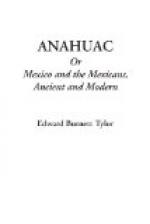When the sun grows hot, the bare earth heats the air that lies upon it so much that an upward current rises from the whole face of the valley; and to supply its place the little valleys and ravines that open into it pour in each its stream of cooler air; and wherever two of these streams, flowing in different directions, strike one another, a little whirlwind ensues, and makes itself manifest as a sand-pillar. The coachman’s “molino de viento,” as he called it, may very well have happened, but it must have been a whirlwind on a large scale, caused by the meeting of great atmospheric currents, not by the little apparatus we saw at work.
There seems to be hardly a village in the plain; and the only buildings we see for miles are the herdsmen’s houses of stone, flat-roofed, dark inside, and uninviting in their appearance, and the great cattle-pens, the corrals, which seem absurdly too large for the herds that we have yet seen; but in two or three months there will be rain, the ground will be covered with rank grass, the corrals will be crowded with cattle every evening; the mirage will depart when real water comes, dust and sand-pillars will be no longer to be seen, and all the nine horses and mules of the diligence-team, floundering, splashing, and kicking, will hardly keep the heavy coach from settling down inextricably in the mire. And so on until October, and then the season of water, “la estacion de las aguas,” will cease, and things will be again as they are now.
In the usual course of travel to the capital, the second night would have been passed at Puebla. This is the second city of the Republic, and numbers some 70,000 inhabitants. As it was then in revolt, and besieged by the President and his army, we made a detour to the north when about 20 miles from it, in order to sleep for a few hours at Huamantla, a place with a most evil reputation for thieves and vermin; and about ten at night we drove into the court-yard of a dismal-looking inn. Three or four dirty fellows stood round as we alighted, wrapped in their serapes—great woollen blankets, the universal wear of the Mexicans of the plateaus. One end of the serape was thrown across from shoulder to shoulder, and hid the lower part of their faces; and the broad-brimmed Mexican sombrero was slouched over their eyes; we particularly disliked the look of them as they stood watching us and our baggage going into the inn. A few minutes after, we returned to the court-yard to complete our observation of them, but they were all gone.
A party of Spaniards and Mexicans were at the other table in the sala when we marched in, and as soon as we had taken off the edge of our fierce hunger, we began to compare notes with them. “Had a pleasant journey from Mexico?” They all answered at once, delighted to find an audience to whom to tell their sorrows, as men always are under such circumstances. It appeared that they had reached Huamantla an hour or two before us, and to their surprise and delight




